
Vasyl Stus. Letters from imprisonment YouTube
Vasyl Stus, Selected Poems, translated and edited by Jaropolk Lassowsky, introduction by George Y. Shevelov (Munich: Ukrainian Free University, 1987). Born in Donbas, Vasyl Stus.

How Ukraine's Vasyl Stus Used Poems to Fight the Soviet Regime YouTube
VASYL STUS (1938-1985) was a poet, translator, and literary critic, widely regarded as one of the foremost authors in the Ukrainian language. He is renowned for his acutely tragic philosophical poems, complex imagery, and frequent use of rare words and self-invented neologisms.

Today, January 6th, marks 83 years since the birth of Vasyl Stus
Vasyl Semenovych Stus (Ukrainian : ´ ´ ; January 8, 1938 - September 4, 1985) was a Ukrainian poet and publicist, one of the most active members of Ukrainian dissident movement. For his political convictions, his works were banned by the Soviet regime and he spent 23 years (about a half of his life) in detention.

(PDF) The Most Significant Receptive “Node” of Vasyl Stus’ Poetry
10 January, 16:01 4218 0. Some 80 years ago, one of Ukraine's most famous poets was born. Vasyl Stus spent most of his life in detention for his political convictions, until his death in Perm-36; a Soviet forced labor camp. Using 14 of his poems and literary articles as evidence, the KGB accused him of anti-Soviet sentiment and propaganda.

Thriving in Isolation and Beyond The Empowering Poetry of Vasyl Stus Los Angeles Review of Books
Bohdan Tokarsky is a literary scholar specialising in Ukraine's twentieth-century and contemporary literature, with a research interest in the intersections between poetry, philosophy and psychology. He completed his doctoral work on the poetry of the Soviet dissident poet Vasyl Stus at the University of Cambridge where he also taught as.

The case of Vasyl Stus. A collection of. Kipiani Vakhtang
Vasyl Semenovych Stus was a Ukrainian poet, translator, literary critic, journalist, and an active member of the Ukrainian dissident movement. For his political convictions, his works were banned by the Soviet regime and he spent 13 years in detention until his death in Perm-36—then a Soviet forced labor camp for political prisoners, subsequently The Museum of the History of Political.

Ukrainian Institute on Twitter "In the first poem that Vasyl Stus wrote whilst in custody, he
Vasyl Semenovych Stus ( Ukrainian: Васи́ль Семе́нович Стус; 6 January 1938, Rakhnivka, Ukrainian SSR - 4 September 1985, Perm-36, Kuchino, Russian SFSR) was a Ukrainian poet, translator, literary critic, journalist, and an active member of the Ukrainian dissident movement.

Versensporn 51 Wassyl Stus Lyrikzeitung & Poetry News
10/01/2018 2 minute read Some 80 years ago, one of Ukraine's most famous poets was born. Vasyl Stus spent most of his life in detention for his political convictions, until his death in Perm-36; a Soviet forced labor camp. Using 14 of his poems and literary articles as evidence, the KGB accused him of anti-Soviet sentiment and propaganda.

Prisma Ukraïna Thriving in Isolation and Beyond The Empowering Poetry of Vasyl Stus
The brilliant East Ukrainian poet and Soviet-era dissident Vasyl Stus (1938-85) became renowned only after his reburial in late Soviet Ukraine in 1989. What are the reasons for the widespread admiration for him in post-Soviet Ukrainian society? The exceptional beauty of his poetry? His stunning courage and selflessness as a Soviet dissident?

Vasyl Stus Biography Ukrainian poet and dissident Pantheon
by Vasyl Stus A stranger lives my life and wears my body— it starts to seem—he spends my years on earth instead of me. I have no eyes and ears, no mouth, no hands and feet. I am estranged inside my body, and—a lump of pain— I hover, shut-in-self, in total darkness. At birth, your psyche ended up stark naked: you failed to graft together.

i am not here. i did not die. Words, Inspirational quotes, Quotations
Vasyl Stus Category: Poems. from Spring 2022 • Issue 101. The Lord has started being born within me and, half-recalled and half-forgotten, waits. Eiléan Ní Chuilleanáin, as well as poems by Romalyn Ante, Natalie Linh Bolderston, Gboyega Odubanjo, Oksana Vasyakina, LeAnne Howe, Mona Kareem, and Robert Selby. Buy the Spring 2022 issue

Thriving in Isolation and Beyond The Empowering Poetry of Vasyl Stus TRAFO Blog for
Stus, Vasyl [Стус, Василь], b 8 January 1938 in Rakhnivka, Haisyn raion,. and Zolotokosa krasunia (The Golden-Braided Beauty), containing Stus's poetry found in the KGB archives. A 4-volume (in 9 books) edition of Stus's works was published in Lviv in 1994. A project of publishing a 12-volume edition of Stus's collected works.

A Poem from Ukraine, by Vasyl Stus World Literature Today in 2022 Professor of mathematics
Vasyl Stus (1938-1985) was one of the most significant Ukrainian poets of the second half of the twentieth century. A poet, translator, literary critic, and journalist, he was prosecuted by the Soviet government for his views on art and politics and died in a Siberian prison.

Ukrainian Institute on Twitter "Today is Kyiv Day. Read this poem about Kyiv by Vasyl Stus
Vasyl Stus: poems in English The chamber opera Stus: Passerby has 12 poems by the Ukrainian poet that form the basis of 10 musical compositions. English translator: Oleksandr Fraze-Frazenko Читати в оригіналі! Auf Deutsch lesen! Czytaj po polsku! Oleksandr Fraze-Frazenko Film director, clipmaker, music producer, writer. Lviv / New York

Matthew Raphael Johnson, "The Ukrainian Solzhenitsyn The Poetry of Vasyl Stus," Part 3
Boccaccio, Defoe, and Camus may teach us a great deal about life in the shadow of plagues, but few authors provide a better example of surviving and finding meaning in isolation than Vasyl Stus.

Vasyl Stus. Repressed by the Soviet authorities for his belief in the necessity of conserving
Instant Echeck GreenPay™ $ I want to leave my name up here! Next When Perfect Families Go Wrong 3,156 words Part 2 of 3 III. Solid ground is death; it's the rule of matter and the mundane; both air and water are the alternative, the boundary between the nominal and the Real it refuses to see.